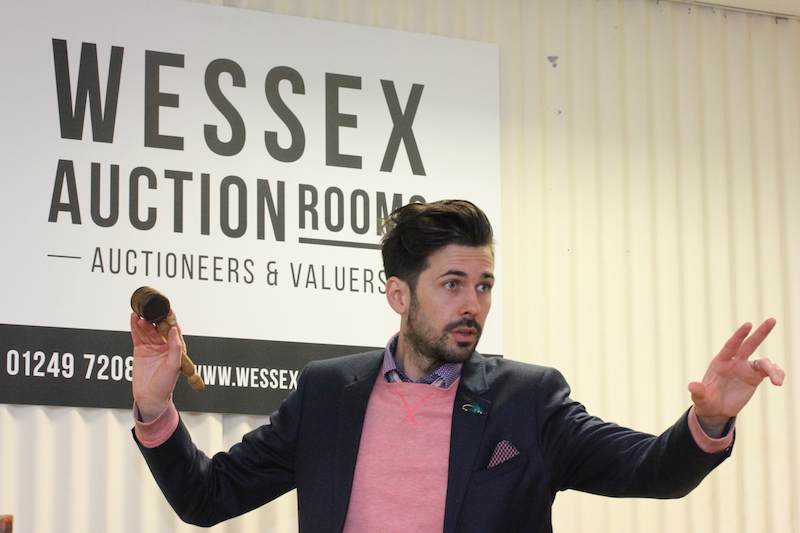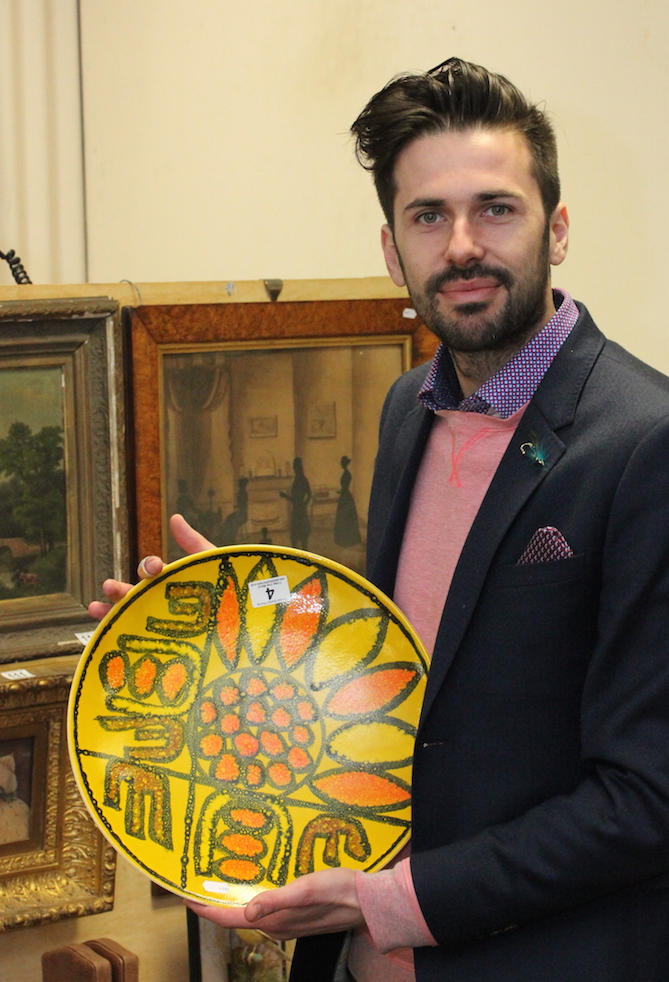Trade Talks – Tim Weeks of Wessex Auction Rooms
 As a director, auctioneer, valuer and cataloguer at Wessex Auction Rooms, Tim Weeks is a well-known face in the antiques trade, and one that’s set to become even more familiar with his recent appearance on the BBC’s Bargain Hunt.
As a director, auctioneer, valuer and cataloguer at Wessex Auction Rooms, Tim Weeks is a well-known face in the antiques trade, and one that’s set to become even more familiar with his recent appearance on the BBC’s Bargain Hunt.
What areas/items are currently selling well?
Functionality is key for me. We are finding that many of the new auction goers are buying ‘to use’ rather than collect. 20th Century works of decorative art, particularly pottery and metal ware are something that we cannot get enough of presently. Antiques represent recycling at its very best and it feels like the general public are coming around to that.
What do you think are the current ‘good investment’ items – ones to watch?
I would go with silver. You always have that intrinsic value of precious metal that protects the investment but with the amount that has gone to the pot over the last 10 years I can see demand massively outweighing supply in years to come. I’ve seen wonderful Art Deco tea sets being scrapped and they certainly aren’t making any more of those!
 What antiques do you have at home?
What antiques do you have at home?
My wife and I have a crazy eclectic taste that mixes Arts and Crafts, Art Deco and the 1960s. I’m currently sat in the lounge where I can see an Art Deco mirror next to a Denby bulbous vase, a Troika coffin vase, a Sanky copper jug and an anglepoise lamp, plus I’m sat on a Victorian button back. We are bit all over the place but I guess that’s what happens when you work in an auction house.
What do you think will be the antiques of the future?
I think it will be based around nostalgia. Items that pull at the heart strings and remind us of those perfect days of youth. I’m fascinated at the thought of electricals becoming collectables such as a Sony Walkman or a Nokia mobile phone. Imagine yourself going out with a group of friends and having one of them show off a Sony Walkman that they found in the attic, would the reaction be ‘urgh that’s horrible and a thing of the past’ or would it be ‘oh my goodness I had that exact same one, I love it’? I reckon I would end up trying to buy one.
How is the industry changing and what will it look like in the future?
Antiques and auctioneering for me is the new Rock n’ Roll. This is the greatest industry in the world to work in and we just need to prove it to the ‘outsiders’. It currently misses a younger, hipper edge but that is what will change with education and I hope that I can contribute towards that. I want to see young people of 16-21 entering the industry as a career regardless of their background. There is no better industry for opportunity where you can start right at the bottom and end up at the top if you put the work in. My biggest fear for the future is that online bidding becomes more and more prominent on a sale day. While no-one argues that online bidding has been a hugely positive thing for the auction industry, I would worry if it took over from the importance of a busy room on a sale day. I am a purist that wants to feel the energy of an auction room, see the whites of the buyers’ eyes and create a connection with people. If the day ever came where auctions are an online only affair, that’s the day I’ll put my gavel on the shelf.
Tell us some trade secrets – what are your top tips for buying antiques?
I think the greatest secret is something so obvious yet often over-looked and that is to concentrate on what you love and what fuels your fire. At my auction house, we hold numerous specialist auctions and they are all my favourite areas within the market – Toys, 20th Century Decorative Arts, Sport, Silver & Music. I work some very long hours, yet I never feel like I’m working and I’m sure that this is due to being able to deal with subject matters that I could never get bored of. I’m excited every day by what I see – just ask my colleagues!
What antiques/artworks would you buy if money were no object?
My mind is literally exploding at the thought! I’d have an original LS Lowry next to a Francis Bacon on the sitting room wall for me; a library of 1st edition classics for my wife; and my six year old son is a budding palaeontologist so I’d work on a collection of dinosaur eggs for him. My daughter is a bit young so I guess I’d buy her a Warhol and add it to my new feature wall until she’s a little older.
You’re down to your last 50 quid – what antiques/art would you buy?
 I love 1960’s pottery so I would have to go down that route. I might not be able to stretch to a piece of Troika so I’d buy as much Poole Pottery as I could. I often say that Poole of the 60s and 70s defines my taste as it’s colourful, unpredictable and exciting. Of every item that I own it is my Poole charger which we have as a centrepiece on our dining table that I find myself glancing at more than anything else.
I love 1960’s pottery so I would have to go down that route. I might not be able to stretch to a piece of Troika so I’d buy as much Poole Pottery as I could. I often say that Poole of the 60s and 70s defines my taste as it’s colourful, unpredictable and exciting. Of every item that I own it is my Poole charger which we have as a centrepiece on our dining table that I find myself glancing at more than anything else.
Where are your favourite antique hunting destinations?
Being the owner of an incredibly busy auction house my biggest regret is that I so very rarely get the opportunity to make a trip to the brilliant fairs that we have in this country. One of the biggest thrills about appearing on Bargain Hunt is that it has given me the opportunity to visit the Peterborough and Ardingly fairs which were both immense. But overall, as a Bath boy I love nothing more than taking the family to the Bath Vintage & Antique Market; it’s only small but it’s on my doorstep and it’s a perfect start to a Sunday.
What are some of the biggest mistakes that buyers make?
Assumptions. Always make sure that an item is exactly what you want it to be before bidding. Don’t assume it’s perfect, go and look at the item. If you can’t attend the auction ask for condition and advice before over committing on price.
How does the industry encourage younger buyers?
I don’t think it does. You certainly don’t see enough younger buyers at the fairs or in auction houses. It’s both mine and my business partner’s aim to show what an incredibly exciting industry we are a part of and that eighteen and twenty-one-year-old school or university leavers should be desperate to join the revolution of brilliant young valuers and auctioneers that we have in this country. Being two very young owners of an auction house, we use social media and word-of-mouth to attract a younger audience as well as the experienced auction goer. I ask a lot of twenty-somethings whether they have ever been to auction and the reply tends to be ‘no chance, I’d be scared to death’. I want my auction house to be as approachable as a National Trust attraction – something that caters for, respects and appreciates all generations. The auction room is the most wonderful place to experience, so let’s open the doors and let them eat cake!


